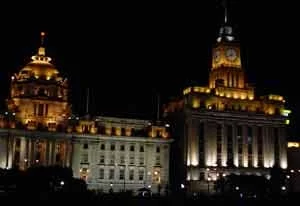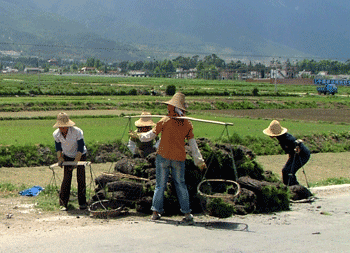Shanghai protects environment shock
April 19, 2004
IN 1805, seven of the most powerful pirate groups in China decided to form a federation, whereupon they carved up the coast between them. Eventually, the British Navy turned up, and using Hong Kong as their base to trade tea, silk and opium, they sought to set up a pirate-free zone all along China's eastern seaboard. During a routine patrol of the Yangtze Delta, they discovered an island. A hundred and fifty years later, Shanghai Eye was sailing around that very island, and discovered that it has now been designated as a special environmental protection zone. Apparently, it has a special kind of grass. And some fish.
This, of course, was another junket for journalists. At some unearthly hour on Saturday morning, we arrived at the Pudong Airport Dock and embarked a small and scruffy government-issue vessel, our hangover just a hint of what was to come later. The cold wind actually came as something of a relief, even if it kept blowing out our cigarettes as we perched on the stairs leading to the deck, and even if it kept creating paranoid fantasies about being blown off the ship into the grey, squally seas.
After pushing the representative from Shenzhen Daily into the ocean as she was asking the expert the names of the several types of fish to be found down below, we decided to ask some questions of our own. What, for example, were the little wooden boats doing if there was in fact a fishing ban in the area? They were, apparently, just resting.
The great white hulk of Pudong International Airport was clearly visible as we sailed around the edge of the island, unable to disembark because of the inadequate docking facilities and the appalling winds. The noise of the boat's aging engine was enough to drown out the sound of any overflying aircraft.
There were a number of other boats sailing to and fro: cargo ships laden with gravel, entering and exiting the Yangtze perhaps, as well as a number of rogue fishermen inching past.
Shanghai Eye was then interviewed, and said how good it was to find an area so close, geographically, to Shanghai itself, and yet so conceptually remote - an area off limits to development, an area where there will be no high-rises, no real estate wars, no Starbucks. Looking for something positive to put on the evening news, the interviewer then asked us if we had confidence in the Pudong government's ability to protect the island, and we said we did, because... But the because didn't matter, because they probably decided to chop the rest of our speech.
In China, interviews are cut to bring out the best and most favourable. In Shanghai Eye's experience, the opposite is the case abroad, and one can only say that they are both equally true, or untrue.
And so, on to the Pudong Green Belt Management Centre, where a smart, sharp government official was waiting for us. The park in which it was situated used to be farmland, and the 3,000 or so peasant residents were allowed to stay and work as gardeners. The area was magnificently landscaped, with its canals and white stone bridges. Shanghai Eye was suspicious. And we were looking for something we could cut into a critical account of the government's environmental policies. Thus, we asked if Shanghai's success came at the expense of other regions.
Someone said that the shift of the burden, that passing of the buck, is an inevitable part of development. An official said that these days, the trade-off between economic development and the environment was a false one, and that environmental protection and economic growth could be achieved at the same time. Shanghai Eye then quoted the governor of Yunnan, who said recently that environmental protection could only come when the economy was already strong enough. We quoted the governor of Chongqing, who also said recently that he was "ashamed" that Chongqing, while setting the fastest economic growth rate in the country, had also become second-worst in the air-quality rankings. We then mentioned the overdevelopment of the rivers in Yunnan, where the big power firms are all moving in to build hydropower facilities on a number of the region's untouched rivers, and where many local people in the area were getting angry that the coast was always being given the priority, that the power stations being built in the west - by companies based in the east - were of no benefit at all to the locals.
Still, the green belt was a great thing, and indicated - at least - that there was a point where Pudong would stop growing. But it was a good thing for rich Shanghai, and our suspicion was that rich Shanghai - and Guangdong, Beijing, Zhejiang, Jiangsu - are now in a position to export their problems to the interior.
We don't look at it like this anymore, said the official. We shouldn't look at it on such a narrow self-interested basis, and should look at the overall benefits. We're all citizens of the world, he said, also citing the example of foreign companies coming to China to benefit from the cheaper production costs, and thereby creating - in the parlance of official government clich?- a "double-win" situation.
Which is all very well for someone living in Shanghai, of course. It is surely harder to persuade the people of Shanxi about the double-win, when their cities are collapsing, their water-supplies dwindling, and their skies blackening out.
(first published by Shanghai Eye, 19/04/2004)






